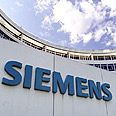
Siemens pulls plug on solar operations
Electronics giant to lay off 70 employees in Beit Shemesh plant, thereby pulling out of Ashalim tender for thermo-solar power stations in Negev
The company explained that the decision stemmed from changes in the solar energy market in recent years, which made its activity in the market economically unviable.
In effect, the announcement means Siemens is pulling out of the Ashalim tender for thermo-solar power stations in the Negev desert, a move revealed by Calcalist several days ago.
Consequently, 70-80 of the plant's workers will be laid off and Siemens will fervently search for a buyer to acquire the energy plant.
According to Michael Suess, member of the managing board of Siemens AG and CEO of the energy sector, "Due to the changed framework conditions, lower growth and strong price pressure in the solar markets, the company’s expectations for its solar energy activities have not been met."
Suess added that "the global market for concentrated solar power has shrunk from 4 gigawatts to slightly more than 1 gigawatt today. In this environment, specialized companies will be able to maximize their strengths."
Until Siemens finds a buyer for its Siemens-Solel plant in Beit Shemesh, the plant is operating in a reduced format with operations limited to the supply of equipment, and its workers have already begun receiving notices of the move.
The company promised employees it would not sell the plant to a buyer who does not intend on continuing its solar power production.
Ex-Solel CEO seeks to buy back company
Former Solel-Siemens Israel CEO Avi Brenmiller said in response to the announcement that he would bid to buy back the company from Siemens, Calcalist has learned.
Brenmiller will have to contend with Shikun & Binui Renewable Energy, Spanish Abengoa Solar and the Chinese government.
It appears that the Spanish solar energy company will replace Siemens in the construction project of two 220 mega watt thermo-solar power stations at a cost of $1 billion.
Brenmiller said, "I regret Siemens' decision. The company has global interests in the energy market and apparently it does not believe they can be met in the solar energy market.
"Solar energy requires research and development, particularly in the context of companies which view solar energy as an important and efficient source of energy. This is why I chose to leave Siemens and pursue my vision by founding a new company.
"This field makes an important contribution to Israel's energy independence as well as to the ecology, and offers an economic solution that is suitable to the conditions in Israel and in other countries.
"In light of Siemens's decision, we are considering the acquisition of Solel's activity," he concluded.
Sources on the market estimate that the price tag on Siemens's activity in Israel is "light years away" from the value of the acquisition deal signed in late 2008 ($418 million) and will total just tens of millions of shekels.
Promises disappeared into thin air
The Solel-Siemens acquisition in late 2009 was accompanied by a host of ceremonies and announcements, making extravagant promises to employees.
Siemens acquired Israeli Solel for $420 million and wasted no time in storming Israel's solar energy tenders.
In May 2011, the company planned to recruit an additional 300 workers as part of its expansion scheme; however, it began experiencing a downturn in its operations, and in April 2012 announced a partial shutdown of its Israel operations and the layoff of dozens of employees.
This report was originally published in Hebrew by Calcalist










